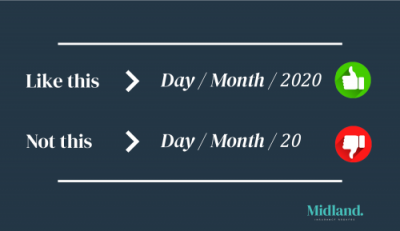
As we roll into a new year and a new decade, the 'twenty-twenties' has provided scammers with a unique opportunity to forge documents and potentially defraud you.
Even though it’s common practice to shorten the year when writing down a date, doing the same abbreviation in 2020 could leave you open to all sorts of legal ramifications.
For example, adding a '21' to the end of an old / out-of-date cheque marked 01/02/20 could potentially reinstate its value. Similarly, an agreement to pay someone a monthly amount could be back-dated to 2018, meaning you might be liable to pay considerably more than actually required.
Scam 'artists' are aptly named for a reason - they're a clever bunch and will find loopholes to manipulate you where they can. So, don't take the risk for a fix that requires minimal effort. Err on the side of caution. Get into the habit of writing the year in full when signing and dating any legal and financial documents, such as contracts and cheques.
Where are the biggest problem areas?
Employment contracts
Abbreviating 2020 to 20 in your employment contract could cause problems when it comes to your entitlement to certain benefits if the date were to be amended to a year or two later. This is because a lot of benefits, (e.g. annual leave, sick pay, maternity pay), are determined by your length of service and your employer could get away with paying you less than what you’re entitled to.
Loan & payment contracts
Write the date out in full when entering into any new financial contracts. If a loan contract states repayment is to start 12 months from the date it was taken out (01/03/20), the year could easily be changed to 2019 by the lender or another party. This could lead them to demand repayment straight away.
Another way you could be caught out is if they backdate the contract, making it look like you’ve had the loan for a longer period of time so they can charge you more in interest.
Vehicle transfer documents
If you buy or sell a vehicle within 2020, it’s crucial you write the full date on any ownership or transfer documents. This is because the new owner could change the date on the documents to make it appear as if you were the owner of the vehicle at a time of any motoring offence, such as speeding, red light cameras, parking fines, or even criminal activity.
Tenancy documents
If you start a new rental tenancy this year, make sure you write the date in full when signing the rental contract. Problems could occur if the landlord were to change the date on the agreement to make it appear as if you lived in the property before you actually moved in, or even after having actually moved out. This could make you liable for damages to the property that occurred before or after you were living there.
Insurance documents
It’s important to make sure that all documents to do with any insurance policies show the right dates in terms of cover start and expiry dates. Writing an abbreviated date such as 03/03/20 could be easily altered by somebody else, leading to a lot of unnecessary problems should you need to make any claims.
Personal agreements & contracts
If you loan a friend some money and enter into any personal agreements or contracts with them, include the full date by which the money should be repaid by. If the date was abbreviated, then it could potentially be changed by the other party in order to add an extra year or two on to the repayment term.
Take a little extra caution this year and write out 2020 in full wherever it calls for it, because it will go a long way in ensuring you and your business are protected from back-dated fraudulent transactions and identity theft risks.
DISCLAIMER:
This article is informational only and should not be construed as individual advice as it does not consider your individual needs. You should consider if the insurance is suitable for you and read the Product Disclosure Statement or policy Wording before buying insurance.












